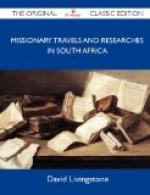Sending the Gospel to the heathen must, if this view be correct, include much more than is implied in the usual picture of a missionary, namely, a man going about with a Bible under his arm. The promotion of commerce ought to be specially attended to, as this, more speedily than any thing else, demolishes that sense of isolation which heathenism engenders, and makes the tribes feel themselves mutually dependent on, and mutually beneficial to each other. With a view to this, the missionaries at Kuruman got permission from the government for a trader to reside at the station, and a considerable trade has been the result; the trader himself has become rich enough to retire with a competence. Those laws which still prevent free commercial intercourse among the civilized nations seem to be nothing else but the remains of our own heathenism. My observations on this subject make me extremely desirous to promote the preparation of the raw materials of European manufactures in Africa, for by that means we may not only put a stop to the slave-trade, but introduce the negro family into the body corporate of nations, no one member of which can suffer without the others suffering with it. Success in this, in both Eastern and Western Africa, would lead, in the course of time, to a much larger diffusion of the blessings of civilization than efforts exclusively spiritual and educational confined to any one small tribe. These, however, it would of course be extremely desirable to carry on at the same time at large central and healthy stations, for neither civilization nor Christianity can be promoted alone. In fact, they are inseparable.
Chapter 2.
The Boers—Their Treatment of the Natives—Seizure of native Children for Slaves—English Traders—Alarm of the Boers—Native Espionage—The Tale of the Cannon—The Boers threaten Sechele—In violation of Treaty, they stop English Traders and expel Missionaries—They attack the Bakwains—Their Mode of Fighting—The Natives killed and the School-children carried into Slavery—Destruction of English Property—African Housebuilding and Housekeeping—Mode of Spending the Day—Scarcity of Food—Locusts—Edible Frogs—Scavenger Beetle—Continued Hostility of the Boers—The Journey north—Preparations—Fellow-travelers—The Kalahari Desert— Vegetation—Watermelons—The Inhabitants—The Bushmen—Their nomad Mode of Life—Appearance—The Bakalahari—Their Love for Agriculture and for domestic Animals—Timid Character—Mode of obtaining Water—Female Water-suckers—The Desert—Water hidden.




